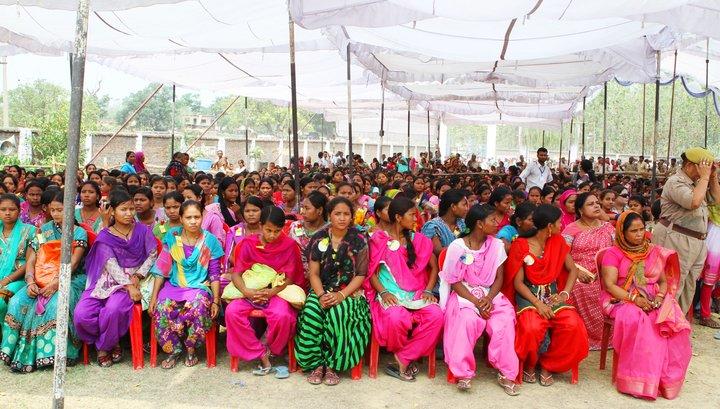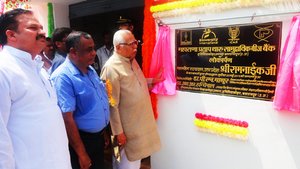New community seedbank to empower indigenous farmers in southern foothills of Himalayas

The southern foothills of the Himalayas are rich in agricultural biodiversity and home to a new seedbank to empower the local Tharu community safeguard traditional varieties for future generations.
The southern foothills of the Himalayas are rich in agricultural biodiversity and home to the Tharu community.The Tharu are indigenous farmers who for hundreds of years have been selecting, using and safeguarding the genetic diversity of many important crops, such as rice, legumes and maize.
A new community seedbank is set to help them continue to safeguard their traditional varieties and associated knowledge for future generations in the face of threats, such as climate change, which are placing them at risk.
450 years ago, the Tharu established a community of 54 villages at Imlia Koder, close to the border of Nepal, when they first moved from Rajasthan. They live their life according to the doctrine of the historic ruler Maharana Pratap, from whom many of the community members believe they are directly descended. Part of this doctrine is to have a great respect for the soil to which they do not add any artificial inputs, such as fertilizers and pesticides.
The Tharu largely depend on what they grow for food, selling only a small quantity of crops at the local market. This means their food basket is diverse, covering different seasons and nutritional needs. Typical food crops on which they depend, include rice, mustard, lentils, chick peas, pigeon peas, wheat, maize, oilseed crops, garlic, onions and traditional vegetables, including a very small potato called aloo. This starchy potato is an important ingredient in many traditional dishes, such as aloo-Gobhi, a curry made with cauliflower.
Dr. Prem Mathur, Bioversity International Regional Director, Asia, Pacific and Oceania, (in centre of the photo below at the official opening) describes why the new seedbank is so important:
“The Tharu community needs support if they are to be empowered to continue their traditional way of life and to be able to continue to safeguard the agricultural biodiversity of the Himalayan foothills against the challenges they are facing. Part of this empowerment will come from having the seedbank at Imlia Koder Village where it is easily accessible from the 54 villages, where there are no roads.”
 “We were invited to come and work with the communities through the Deendayal Research Institute, an NGO that is working here implementing welfare programmes through education through the local school and providing sewing machines," Dr. Mathur continued. "The NGO knew of our work in India and recognized the importance of seed diversity to the Tharu, so that is how we got involved but before we decided to go ahead, first we met with the community and local implementation partners to understand more about their needs”.
“We were invited to come and work with the communities through the Deendayal Research Institute, an NGO that is working here implementing welfare programmes through education through the local school and providing sewing machines," Dr. Mathur continued. "The NGO knew of our work in India and recognized the importance of seed diversity to the Tharu, so that is how we got involved but before we decided to go ahead, first we met with the community and local implementation partners to understand more about their needs”.
In Imlia Koder, the Maharana Pratap Tharu Community Seedbank will be managed by the farmers who will bring their own seeds to be safely stored until planting time, like in a bank safety deposit box. In the case of traditional varieties for which seeds are present in very small quantities, the community seedbank will also regenerate the seeds for future use. It will also offer facilities such as seed cleaning and grading which the farmers will be empowered to do themselves, enabling them to better organize which seeds they save. Innovative and economical air-tight containers and Zeolight dessicant beads that absorb 94% moisture, will help keep the seeds dry in storage. The beads, developed by UC Davis as part of the collaborative effort behind getting the seedbank up and running, will also help when storing any surplus foods.
“Apart from empowering the farmers to save their own seeds which are so vital for their food security, the seedbank collection will also allow us to see which varieties are most popular,” Dr. Mathur went to explain. “This means we can prioritize multiplication of these seeds and also look ahead to identifying other opportunities from them, for example, through working with the communities to create value-added products to sell such as jams, or by understanding better the nutritional values or drought-resistance of the varieties. In particular, we are working with the local NGO to ensure that the women in the community are getting the training they need to be involved with the seedbank. Within the communities, women are the ones who select and save seeds. At the inauguration, we were really pleased that around 4500 farmers came (see top photo), many of which were women, showing just how important the seedbank is to them.”
Opening the seedbank is an important first step to help empower the Tharu people but not the end of the story. Bioversity International will continue to work in partnership with the Deendayal Research Institute to make farmers more aware of the diversity available, to help them adapt to the effects of climate change and cater to potential market needs and opportunities.
For more information, please contact:
Dr. Prem Mathur
Additional information:
The ‘Maharana Pratap Tharu Community Seed Bank’ was inaugurated on 20 May 2015 by the Hon’ble Governor of Uttar Pradesh, Shri Ram Naik. The other distinguished guests included Dr. S. P. Yadav, Minister of State for Wildlife and Horticulture, Govt. of Uttar Pradesh, Shri Daddan Mishra, Member of Parliament, Shrawasti Constituency, Dr. P. N. Mathur, Regional Director, Bioversity International, Dr. R. R. Hanchinal, Chairperson, Protection of Plant Varieties and Farmers' Rights Authority (PPV&FRA).
Photo 1: Around 4500 farmers attend the opening of the Community Seedbank at Imlia Koder. Credit: Bioversity International/P. Quek
Photo 2: Honorable Governor of Uttar Predesh, Shri Ram Naik, unveils the inaugural stone with Dr. Prem Mathur, South Asia Co-ordinator, Bioversity International, and Mr. Diddan Mishra, Member of Parliament, Govt of India. Credit: Bharat Pathak/Deendayal Research Institute.
